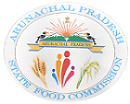My dear Ld. Friends,
Medical and food security play vital role in a human life cycle. Poverty, hunger and nutritional related diseases have distinct affect on child mortality, maternity mortality and quality of life. World over serious thinking started and subsequently leaders pledge to work out on some basic agenda to fulfill the vision by 2015 and the following basic priorities were worked out:-
1. Eradication of extreme poverty and hunger.
2. To achieve universal primary education.
3. Promote gender equality and women empowerment.
4. Reduce child and maternal mortality.
5. Nutritional and environmental related diseases.
Subsequently India took the historical step by converting the existing food programme of Govt. of India into a legal entitlement by enacting the National Food Security Act, 2013(NFSA-2013) on 12th July 2013.
The Acts embraces– National Schemes like Targeted Public Distribution System, Integrated Child Development Service Scheme, Maternity entitlement, The PM Poshan Abhiyan (Mid-day-meal), Janani Suraksha Yojana under four nodal departments under umbrella obligation of centre and state. After the Covid pandemic the schemes like PMGKY, Atmanirbhar Bharat were enacted. The act has been implementing since April of 2016 in our state. For effective implementation of the above schemes under NFSA 2013, quasi-judicial statutory body was constituted as State Food Commission all over India by an Act of Parliament.
An independent State Food Commission was constituted in our state by March, 2019 with two members and a Chairperson and the All Arunachal state Vigilance Committee was constituted subsequently after. These two bodies work in close coordination to protect and secure NFSA 2013 with specific power and function.
NSFA-2013
The main provisions of the Act in short is as follows-
A. Every priority household shall be entitled to 5kg rice/person/month at subsidised price.
B. Pregnant and lactating mothers will be entitled to free meals at anganwadi centers during pregnancy and till Six months after birth. They will also be provided with Rs.6000 in installments.
C. Every child unto the age of 14 years will be entitled to free meals at school till class viii.
D. In case, the govt. is unable to provide the food grains. It shall provide adequate monetary compensation as prescribed in the Act.
E. The Govt. shall endeavor to undertake reforms in the TPDS by introducing steps like doorstep delivery of food grains, complete digitalization of Ration Card etc.
F. To encourage women empowerment, the women of the house shall be the head of the family for issue of Ration card provided she is not less than 18 years.
G. Every state Govt. shall put in place a grievance redressal mechanism of a state Food Commission at the state level, a DGRO at the District level, who is usually the ADC [HQrs] in Arunachal Pradesh.
H. The Commission constituted should have at last 2 women members among the Six [Chairperson+5 Members] and one person from the SC/ST category.
The main functions of the State Food Commissions as per central gazette are :
1) Monitor and evaluate implementation of the NFSA, 2013, in the state.
2) Either suamoto or on receipt of a complaint, enquire into the violation.
3) Give advice to the State Govt. for effective implementation of the Act.
4) Give advice and directions to the agency and departments of the State Govt. (In Arunachal, The Food & Civil Supply, Elementary School, ICDS, and Family Welfare) involved in implementation of the Act.
5) Hear appeals against the DGRO.
6) Prepare Annual Report to be laid before the legislative Assemble.
7) While hearing appeals and enquiring into any incident of violations of the Act, the State Commission shall have all the powers of a civil court. In case there is concrete evidence of violation of the Act, the Commission can forward the case to the concerned magistrate to try the case under code of criminal procedure, 1973.
In addition vide Section 6 of the State Gazette notification 2020-21
1. Inspect or cause to be inspected, the non-compliance of policy decisions of the Government relating to the Act;
2. Organize regional camps for building awareness about benefits and
Entitlements under the Act and define measure for redressal of grievance;
3. Appoint, in consultation with the Government, consultants and technical
Staffs to assist the State Food Commission;
4. Lay down procedure for day-to-day functioning.
After Constitution of the SFC, the Commission started its activities right from accommodation, infrastructure making adoption of policies and guidelines and activation of awareness campaign and Grievance Redressal mechanism in all the districts and state level by way of digitl, media etc. Physical inspection of hundreds FPS/Cooperative centers, ICDS centers, MDM centers, updating of JSY schemes in the health centers done. There were several bottlenecks in our activities like lack of proper accommodation and infrastructure, frequent changes in draft notification but in view of Covid pandemic in the state gave severe blow to our activities as physical movement were restricted. Our activities restricted to issue of policy guidelines and updating of all the schemes under NFSA 2013 with digital ways, media, circular etc. and issues of notices for Covid protocol.
After a relief from Covid pandemic our major activities started with regional, district and block level awareness campaign and Grievance redressal system activation and updating of service delivery of the scheme under different nodal departments with issue of policy guidelines and its mission thereof.
Policies adopted after constitution of State Food Commission.
TPDS
1. Modification of all display boards for easy access of the beneficiaries and compulsory use of display boards in the FPS & Cooperative stores.
2. Regular update of stock register and joint checking system.
3. Deputation of an administrative officer from District Administration to witness the receipt of the commodities from FCI godown to state godown.
4. Proper storage facilities in godown, FPS & cooperative to avoid contamination and damage.
5. Timely renovation of the walls, roof and floor of the fCI godown to avoid soiling and damage of commodities.
6. Storage of the commodities not more than 2 months to avoid quality damage of the commodities.
7. Time bound checking by quality checking officer before delivery.
8. Bags to be properly sealed with certificate from QCO if the commodities are collected for the crutch/damaged/unpolished floor or rain spoiled commodities.
9. Accurate weighting before and after delivery of the commodities.
10. Proper functioning Grievance redressal system. Lack of communication between district administration & ADC was resolved.
11. Penalties and warnings were given through grievance redressal system.
12. Certificate of merit to some sincere officers to encourage better service.
13. The Policies in the delivery system by FCI was updated to avoid mistrust, misunderstanding, communication gap by intervention of grievance redressal system.
14. Authorities of Hundreds of FCI godowns, state transit godowns, FPS stores, cooperative stores were instructed, and placed before the higher authority for renovation.
15. Govt. was advised for
a) Budgeting the margin money for timely payment.
b) Updating of contractors carrying charges to solve their grievances.
c) Installation of food checking laboratory.
16. Complaint/hearing/grievances to be booked in the court of DGRO & to SFC for transparent and effective delivery system.
ICDS (Women and Child Development) department
Emphasis to be given to the following measures.
1. Attendance of the children to note improvement of the attendance
2. Attendance of the Pregnant/ lactating women to note improvement of attendance.
3. The quality and quantity of the food being provided to the children are checked and its acceptability by the children examined.
4. Food items are properly cooked and tasted before serving the children and fortified with vegetables and other vitamins rich supplements.
5. The children are given lessons on health, hygiene, sanitation and nutrition.
6. The Anganwadi centers is attached with storage and toilet facilities. And if any, whether cleanliness maintained with proper water supply is available.
7. Proper implementation of PMMVY schemes for pregnant ladies/lactating mothers, and timely payment of installments and registration process is properly maintained.
8. Distribution of IFA and other supplements for Pregnant and Lactating mothers are timely and periodically distributed and properly checked before distribution.
9. Sources of fund and its expenditure with all transparency and accountability has to be maintained and timely submitted to the State Food Commission.
10. Display boards to be maintained in every centers and another display board with time to time measures.
11. Proper registration in distribution of food items during off time for accountability and transparency specially during natural calamities/ health disaster.
12. Compulsory maintenance of forms during visit of the inspection team.
13. Proper maintenance of records regarding funds allocated and total spent and has to be submitted to the authorities as timely.
14. Any discrepancies anywhere to be tried the court of DGRO and State Food Commission.
TPDS
1. Hundreds of ICDS centers were inspected and instructed for proper proper maintenance of display boards in every Anganwadi centers.
2. Update maintenance of register of students, pregnant and working mothers.
3. Items given to children are properly checked before serving to children and mothers.
4. Water supply and toilet facility was not covered in maximum centers. By now maximum centers are covered with toilet after instruction.
5. Stores of the commodities were cleaned and sanitized.
6. Cooked items are tested by the cook and the attendant before serving the children. Even the visitors were advised to check the cooked items.
7. Most of the Anganwadi centers were in dilapidated state and after intervention many centers were renovated/newly constructed with full toilet and store facilities.
8. Posha items served was old and not suitable to the children and it was resubstituted as per demands of the children.
9. Awareness for sanitation and hygiene and importance of Vitamins, minerals in the diet and education for importance of fruits, vegetables in the diet.
10. The qualification of the attendant have been made above 8 class.
11. Forms have been presented for filling during the visit of any supervisor/inspection team/officers.
12. Establishment of food testing laboratory discussed with Govt.
13. Filling up of the DD(ICDS) post discussed with Govt. and Govt. has acted accordingly.
14. Instruction given for maintenance of register for issue of food items in the village off days for transparency.
Mid- day Meal(PradhanMantriPoshan Yojana) under Elementary Education Guidelines
1. The place of kitchen is in a proper hygienic area and the cooking area with proper uniform and masks.
2. The hot cooked meal is tested by the school authority before serving the meal to the children.
3. The meals are fortified with vitamins and minerals rich vegetables.
4. The place of dining is under proper dining shed to avoid food contamination and poisoning.
5. The toilet facilities and its cleanliness are to be maintained to avoid food poisoning/contamination andwith proper water supply.
6. The cooks are properly paid or not.
7. Compulsory Kitchen garden.
8. Proper storage facilities to avoid damage to the food items.
9. The funds have been properly utilized with fulltransparency and accountability and timely submission of report to the State Food Commission.
10. How far the objectives of PMPY (MMD) is fulfilled.
11. Uniforms to the cook are available or not.
12. Water connections to the toilet and kitchens.
13. Display Board of daily menu has to be properlydisplayed as per section 10.
14. Proper registration at the village level at the time of school off days during natural calamities,disaster etc.
15. Timely submission of reports to the authorities with facts and figures.
16. Violation of the guidelines shall be booked in the court of DGRO initially and then to SFC as per proceedings.
17. Forms supplied have to be properly filled up during inspections.
Achievement (TPDS)
1. Irregular rate of Rice in FPS/ Cooperative stores stabilized.
2. Display Boards in all FPS/Cooperative stores updated.
3. Social audit system systematized withmonitoring update of stokes register every three months.
4. Administrative officer from the district administration placed at the time of receipt of commodities FROM FCI godown along with Civil Supply officer.
5. Separate stoke register for different scheme like PDS, PMGKY and AtmaNirbhar Bharat being maintained.
6. Unsealed bags without verification of quality checking office are rejected and sent back with direction to FCI to stop repeat of such services.
7. Damaged, old FPS/ Cooperative stores were instructed to renovate of the store, or godown to avoid damage.
8. Difference between district administration and DGROs in Grievance Redressal system was resolved.
9. The Grievance Redressal mechanism were fully updated and activated and several local level, district level and state level grievance were resolved after hearing the grievance at DGRO and SFC level respectively still many hearings are going on for some long pending cases. Yearly update is being taken for pending cases in higher courts.
10. Awareness campaign in the district and block level had good impact in the systemization of the delivery systems.
11. Frequent meeting with FCI and different nodal department officerbrought in proper coordination in the functioning system.
12. Awareness was as given through media and public meeting at various centers.
13. Problem in delay of margin money discussed with the govt. level.
14. Increase in Carriage contractor’s carriage rate discussed with govt.
15. Establishment of a food testing laboratory discussed with Govt.
16. Timely renovation of godown discussed with higher FCI level.
17. Maximum FCI and Cooperative center’s connected with roads.
18. Some roads already damagedis being worked out with the Govt. for the early renovation for timely delivery of commodities.
19. Annual reports being published to place in the assembly regarding performance and budgetary of all nodal departments and SFC for transparency.
20. Forms have been circulated to fill up during inspection by the authority.
PM Poshan Abhiyan (Mid-day-meal)
1.Introduction for sanitation, cleanliness of the toilet with adequate water supply is being followed as per guidelines.
2. Hundreds of centers were physically inspected and guidelines being followed. Most of the toilets were unhygienic and the authorities were directed to keep the loilet clean.
3. The outdoor MDM system were abolished and brought to indoor MDM for proper sanitation. Many constructed separate dinning shed.
4. Direction to keep the kitchen/cooking area hygienic is being followed.
5. Kitchen garden was encouraged for vitamin, mineral supplements with Agriculture department.
6. Menu of the MDM is fixed as in display board.
7. Up to date maintenance of registration for home delivery during off days of center to facilitate transparency.
8. Annual reports being published and placed in Assembly regarding performance and budgetary of all nodal departments and SFC for transparency.
9. Forms have been introduced to fill up during inspection by authorities.
Guidelines were issued to FCI.
1. During receipt of rice from FCI Godown, an administrative officer from district will witness the receipt and enter proper loading and unloading and get certified.
2. Godown floor and roof has to be water-proof and soiling proof.
3. The floor of the godown has to be devoid of cracks. For minor cracks it has to be covered with plastic to avoid soiling.
4. Timely renovation of the godown necessary.
5. Timely checking by quality officer must as per guidelines.
6. Rice should not be stored more than two months.
7. Repacked rice has to be duly certified by quality checking officer and properly sealed.
8. Unsealed bags will be returned and replaced in time.
9. FCI official guidelines have to be displayed on the front of the godowns.
10. Default of any in the system will be tried in the court of DGRO and SFC.
Many grievances are being heard in the court of DGRO with great satisfaction in the district and some hearing/grievances are being attended in the court of State Food Commission.
The Commission is committed to fulfill the mission of transperant and effective service delivery of the scheme under NFSA 2013.
Grateful for cooperation from all sides. We all can have the fruits of NFSA 2013 with dedication of every agencies involved.
Jai NFS Act and Jai Hind.













